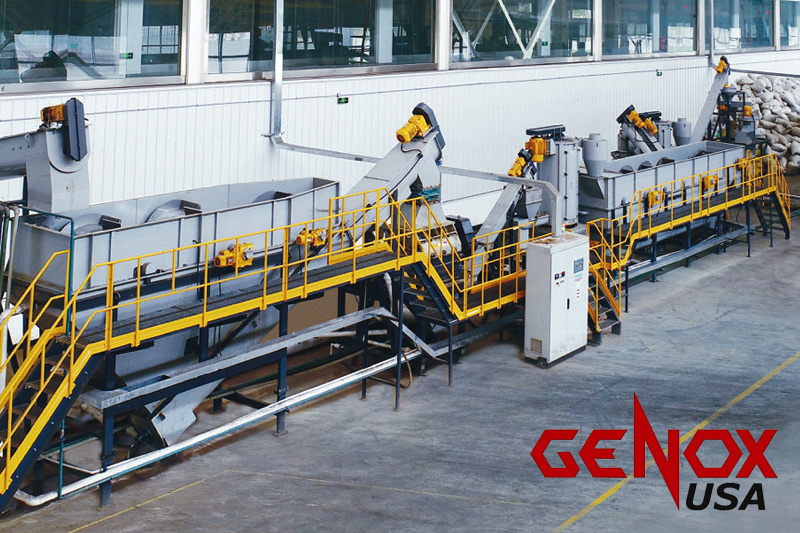Enhancing Sustainability in Agriculture: Wash Lines for Plastic Ag Film
In the pursuit of sustainable farming practices, the agricultural industry is increasingly turning towards innovative solutions to minimize environmental impact. One such key area of focus is the recycling of plastic agricultural films, which play a crucial role in modern farming but can contribute to environmental challenges if not managed responsibly. In this blog post, we will delve into the significance of wash lines for plastic ag film, exploring how they contribute to recycling efforts and promote a more sustainable agricultural ecosystem.
The Challenge of Plastic Ag Film Waste
Plastic agricultural films, commonly used for covering crops and irrigation, have significantly improved crop yields and protected against various environmental factors. However, the widespread use of these films has led to an accumulation of plastic waste in agricultural fields, posing environmental challenges. Traditional disposal methods, such as landfilling or burning, not only contribute to pollution but also waste valuable resources. This is where wash lines come into play as a sustainable solution.
Ag film wash lines have traditionally been hard to maintain as the material that is being processed is highly contaminated and abrasive. Most companies utilize existing standard wash systems for PE material and quickly realize the wear and tear on the equipment. Genox USA has designed specific equipment to handle this high dirt content, up to 80% dirt to plastic by weight. The use of proprietary designs and technologies has allowed them to offer a product that is rugged and easy to maintain against this tough application.
Wash Lines Explained
Wash lines for plastic ag film are specialized facilities designed for the cleaning and recycling of used plastic films. These facilities utilize advanced technologies to remove soil, residues, and contaminants from the films, preparing them for the recycling process. The primary goal is to extend the lifecycle of plastic ag film, reducing the need for the production of new plastic and minimizing the environmental footprint associated with its disposal.
The Recycling Process
Wash lines play a crucial role in the initial stages of the recycling process for plastic ag film. Once collected from agricultural fields, the used films are transported to wash line facilities. Here, the films undergo a thorough cleaning process using water, detergents, and mechanical scrubbing to remove dirt and debris. The cleaned films are then shredded into smaller pieces, which are further processed to create recycled plastic pellets.
Recycling plastic ag film not only conserves resources but also reduces the demand for new plastic production. This helps mitigate the environmental impact associated with the extraction and processing of raw materials required for plastic manufacturing. Additionally, recycling reduces the amount of plastic waste that ends up in landfills or incinerators, contributing to a more circular and sustainable economy.
Environmental Benefits of Wash Lines
Reduction of Plastic Pollution: By incorporating wash lines into the agricultural waste management process, the industry can significantly reduce the environmental impact of plastic ag film. Cleaned and recycled films are less likely to contribute to soil and water pollution, helping to protect ecosystems and wildlife.
Conservation of Resources: Recycling plastic ag film through wash lines reduces the need for new plastic production. This, in turn, conserves valuable resources such as petroleum, which is a primary raw material for plastic manufacturing. By promoting a circular economy, wash lines contribute to resource efficiency and long-term sustainability.
Lower Carbon Footprint: The production of new plastic involves energy-intensive processes that contribute to greenhouse gas emissions. Recycling plastic ag film through wash lines requires less energy compared to manufacturing new plastic. This results in a lower carbon footprint, aligning with global efforts to combat climate change.
Contact Genox USA to Learn More About Wash Lines for Plastic Ag Film
Wash lines for plastic ag film are pivotal in addressing the environmental challenges associated with the widespread use of plastic in agriculture. By incorporating these facilities into waste management practices, the industry can take a significant step towards sustainability. Recycling plastic ag film not only minimizes pollution but also conserves resources and reduces the carbon footprint of the agricultural sector.
As the demand for sustainable practices continues to grow, embracing technologies like wash lines becomes imperative for a resilient and environmentally conscious agricultural future.
Contact Genox USA for more information about wash lines for Plastic Ag Film.

